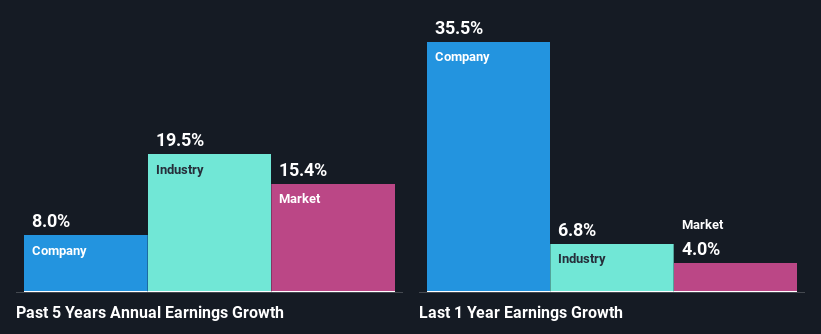Is Park City Group, Inc.'s (NASDAQ:PCYG) Stock's Recent Performance Being Led By Its Attractive Financial Prospects?
Park City Group (NASDAQ:PCYG) has had a great run on the share market with its stock up by a significant 47% over the last three months. Since the market usually pay for a company’s long-term fundamentals, we decided to study the company’s key performance indicators to see if they could be influencing the market. In this article, we decided to focus on Park City Group's ROE.
Return on Equity or ROE is a test of how effectively a company is growing its value and managing investors’ money. In short, ROE shows the profit each dollar generates with respect to its shareholder investments.
See our latest analysis for Park City Group
How Is ROE Calculated?
ROE can be calculated by using the formula:
Return on Equity = Net Profit (from continuing operations) ÷ Shareholders' Equity
So, based on the above formula, the ROE for Park City Group is:
12% = US$5.3m ÷ US$45m (Based on the trailing twelve months to March 2023).
The 'return' is the yearly profit. That means that for every $1 worth of shareholders' equity, the company generated $0.12 in profit.
What Is The Relationship Between ROE And Earnings Growth?
Thus far, we have learned that ROE measures how efficiently a company is generating its profits. We now need to evaluate how much profit the company reinvests or "retains" for future growth which then gives us an idea about the growth potential of the company. Assuming everything else remains unchanged, the higher the ROE and profit retention, the higher the growth rate of a company compared to companies that don't necessarily bear these characteristics.
Park City Group's Earnings Growth And 12% ROE
To start with, Park City Group's ROE looks acceptable. Even when compared to the industry average of 11% the company's ROE looks quite decent. Consequently, this likely laid the ground for the decent growth of 8.0% seen over the past five years by Park City Group.
We then compared Park City Group's net income growth with the industry and found that the company's growth figure is lower than the average industry growth rate of 20% in the same 5-year period, which is a bit concerning.
The basis for attaching value to a company is, to a great extent, tied to its earnings growth. It’s important for an investor to know whether the market has priced in the company's expected earnings growth (or decline). By doing so, they will have an idea if the stock is headed into clear blue waters or if swampy waters await. If you're wondering about Park City Group's's valuation, check out this gauge of its price-to-earnings ratio, as compared to its industry.
Is Park City Group Making Efficient Use Of Its Profits?
Park City Group's three-year median payout ratio to shareholders is 13% (implying that it retains 87% of its income), which is on the lower side, so it seems like the management is reinvesting profits heavily to grow its business.
Along with seeing a growth in earnings, Park City Group only recently started paying dividends. Its quite possible that the company was looking to impress its shareholders.
Conclusion
On the whole, we feel that Park City Group's performance has been quite good. Particularly, we like that the company is reinvesting heavily into its business, and at a high rate of return. As a result, the decent growth in its earnings is not surprising.
Have feedback on this article? Concerned about the content? Get in touch with us directly. Alternatively, email editorial-team (at) simplywallst.com.
This article by Simply Wall St is general in nature. We provide commentary based on historical data and analyst forecasts only using an unbiased methodology and our articles are not intended to be financial advice. It does not constitute a recommendation to buy or sell any stock, and does not take account of your objectives, or your financial situation. We aim to bring you long-term focused analysis driven by fundamental data. Note that our analysis may not factor in the latest price-sensitive company announcements or qualitative material. Simply Wall St has no position in any stocks mentioned.

